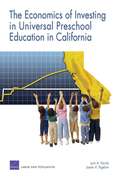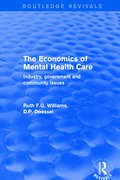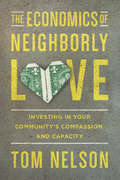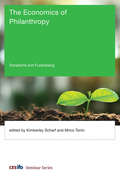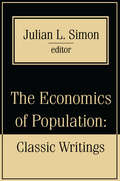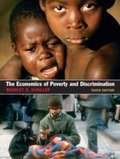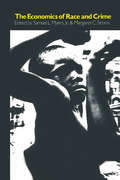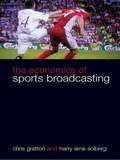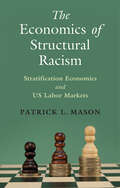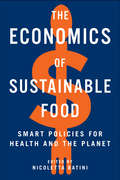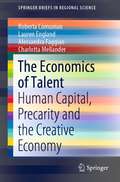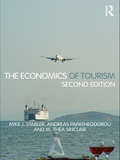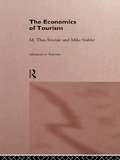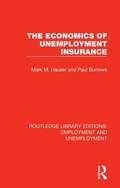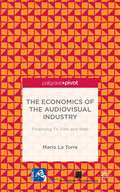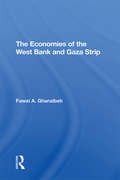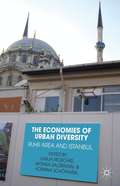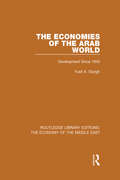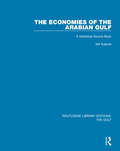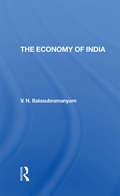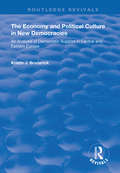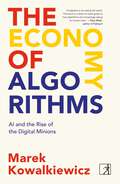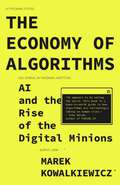- Table View
- List View
The Economics of Investing in Universal Preschool Education in California
by Lynn A. Karoly James H. BigelowThere is increased interest in California and other states in providing universal access to publicly funded preschool education. In considering such a program, policymakers and the public focus on the potential benefits and costs of such a program. This study aims to inform such deliberations by conducting an analysis of the economic returns from investing in high-quality preschool education in the state of California.
The Economics of Mental Health Care: Industry, Government and Community Issues (Routledge Revivals)
by Ruth F.G Williams D.P. DoesselThis title was first published in 2001. This original study of mental health care presents a conceptual approach to the nature of the industry’s multiple outputs. It pays special attention to the economic role of government, and also uses conventional economic theory to analyze the fact that the needs and wants of people with mental illnesses and their care-givers are frequently neglected.
The Economics of Neighborly Love: Investing in Your Community's Compassion and Capacity
by Tom Nelson2017 The Gospel Coalition Book Award What does the good news of Jesus mean for economics? Too often, Christian teaching and ministry have focused only on the gospel's spiritual significance and ignored its physical, real-world ramifications. But loving our neighbor well has direct economic implications, and in our diverse and stratified society we need to grapple with them now more than ever. In The Economics of Neighborly Love pastor Tom Nelson sets out to address this problem. Marrying biblical study, economic theory, and practical advice, he presents a vision for church ministry that works toward the flourishing of the local community, beginning with its poorest and most marginalized members. Nelson resists oversimplification and pushes us toward more complex and nuanced understandings of wealth and poverty. If we confess the gospel of Jesus, he insists, we must contend anew with its implications for the well-being of our local communities. Together we can grow in both compassion and capacity.
The Economics of Philanthropy: Donations and Fundraising (CESifo Seminar Series)
by Kimberley Scharf Mirco ToninExperts bring economic tools to bear on philanthropic activities, addressing topics that range from the determinants of giving to the effectiveness of fundraising techniques.Economists are increasingly aware of the need to better understand philanthropic activities. In this book, economists address a variety of topics related to the economics of philanthropy, ranging from the determinants of giving to the effectiveness of fundraising techniques. The contributions focus on individual motives for giving and volunteering, and in particular how they affect donation outcomes, fundraising decisions, and public policies toward giving. Previous research has viewed motives for giving as embedded in formal models of economic behavior with rational agents who maximize their own utility while constrained by a budget. These models, however, have been shown to have poor predictive power, neglecting direct and indirect motives for giving. The contributors consider, among other subjects, the free-riding problem in these models; altruistic, direct, and indirect motives for giving, addressed both theoretically and with lab experiments; the linear public good game; the role of social information; the effectiveness of matching gifts and premiums; motives for unpaid volunteering; subscription models as a way to regulate revenue streams; and increasing reliance on public funds.Contributors James Andreoni, Jon Behar, Avner Ben-Ner, Ted Bergstrom, Greg Bose, Sarah Brown, Catherine C. Eckel, Christina Gravert, David H. Herberich, Samantha Horn, Fantingyu Hu, Dean Karlan, Ann-Kathrin Koessler, Benjamin M. Marx, Jonathan Meer, Michael Menietti, Bradley Minaker, Mark Ottoni-Wilhelm, A. Abigail Payne, Maria P. Recalde, Kimberley Scharf, Claudia Schwirplies, Marta Serra-Garcia, Sarah Smith, Karl Taylor, Mette Trier Damgaard, Lise Vesterlund, Laura Villalobos
The Economics of Population: Key Classic Writings (The\international Library Of Critical Writings In Economics Ser. #No. 78)
by Julian SimonThe economics of population has a long and controversial history as well as an exciting present. Vociferous popular debate, public policy, and population economics have unduly influenced one another: public debate and policy affect the erection of economists' conclusions just as the results of economists' studies influence debate and popular thought. The words and theories of John Maynard Keynes, Thomas R. Malthus, John Stuart Mill, and Friedrich Engels come to mind immediately. However, many writings on population economics had little or no influence on public thought at the time they were written, although they may be seen as "correct" in light of modern developments. In fact, many of the ideas contained in these writings were publicly debated but then ignored for a long time, reappearing much later or reinvented independently.The Economics of Population, edited by Julian L. Simon, traces the history of population economics. This is a century-spanning collection of essays from foremost influential economic theorists, arranged to illustrate thought development and its numerous reversals. The first section includes essays from Joseph J. Spengler, John Graunt, William Petty, Thomas R. Malthus, William Godwin, and David Ricardo. Theorists such as Alexander Everett, William Peterson, Simon Gray, Henry C. Carey, John Stuart Mill, Friedrich Engels, Henry George, and Charles Fourier are the subject of the volume's second section. Finally, Simon covers the effect of population density and cities on productivity, and the effect of density on agricultural practices and natural resources. Essays from this section include John Maynard Keynes' "Is Britain Overpopulated?" and "The Economic Consequences of Peace" as well as selections from Lionel Robbins, George Simmel, and Alvin H. Hansen.Simon's long-term focus reflects the evolution of population movements. He does not restrict himself to writings that have been important in the historical chain of intellectual influence. Rather, he guides us to key works which shed light on the intellectual history of population economics. Simon includes some essays that, while greatly influential, can also be seen as fundamentally wrong in light of later work. As such, The Economics of Population will be of great value to political economists, sociologists of knowledge, and historians of ideas.
The Economics of Poverty and Discrimination
by Bradley R. SchillerFor courses in economics of poverty and discrimination, welfare politics and policy, social problems, and sociology of poverty, in the departments of economics, sociology, urban studies, education and social work. As the leading college text in the field for over twenty years, this book has been distinguished by its relevant coverage, tight organization, multidisciplinary perspective, and timeliness. The ninth edition preserves these qualities while incorporating new reference material.
The Economics of Race and Crime
by Margaret C. Simms Samuel L. MyersThe relationship between crime and the economy has received too little attention from researchers. This volume remedies that deficit, resurrecting several classic writings on this elusive topic by and about blacks, and presenting new contributions by researchers at the frontier of work on the subject. Among the landmark articles included are W.E.B. Dubois' famous examination of crime in Philadelphia, an analysis of black criminal behavior by Walter Willcox, who was chief statistician of the Census Bureau at the time he wrote this essay, and excerpts from the ninth Atlanta Conference on Negro Crime. The frontier articles use quality microdata to understand particular aspects of criminal justice processes. They address the relationship between employment and criminal behavior, trade-offs among education, employment, and crime, and the link between overall economic conditions and rates of incarceration. Among the authors represented in the landmark research articles are Harold Votey and Llad Phillips, Richard Freeman, David Good and Maureen Pirog-Good, Dario Melossi, and Samuel Meyers and William Sabol. Richard MaGahey concludes the volume with comments on the current status of research in the field. This volume captures the emerging tension within scholarship on race and crime, and provides both a reflective vision of work in this area as well as state-of-the-art research by leading scholars.
The Economics of Sports Broadcasting
by Chris Gratton Harry Arne SolbergSports now constitute one of the most valuable forms of broadcast entertainment in today’s lucrative international market. This textbook explains the economics underlying the sports broadcasting phenomenon. The specific regulatory culture governing sports broadcasting means that the financial economy of this area has many unique features. The Economics of Sports Broadcasting provides an accessible, detailed introduction to all aspects of economics in this fascinating area. The book contains a wealth of textbook features and has been written and designed to facilitate student learning. It includes: questions of ownership, trade and commodity in sport the historical context for contemporary sports broadcasting the key players – viewers, TV channels, sponsors, clubs, event owners and authorities the regulations governing televised sport the international context for broadcast sport competition and game theory in sports broadcasting sports broadcasting’s changing landscape of ownership and supply channels. This book will be useful for courses in media and broadcasting, economics, sport management and sports development.
The Economics of Structural Racism: Stratification Economics and US Labor Markets (Cambridge Studies in Stratification Economics: Economics and Social Identity)
by Patrick L. MasonThis extensive and comprehensive book tracks persistent racial disparities in the US across multiple regimes of structural racism. It begins with an examination of the economics of racial identity, mechanisms of stratification, and regimes of structural racism. It analyzes trends in racial inequality in education and changes in family structure since the demise of Jim Crow. The book also examines generational trends in income, wealth, and employment for families and individuals, by race, gender, and national region. It explores economic differences among African Americans, by region, ethnicity, nativity, gender, and racial identity. Finally, the book provides a theoretical analysis of structural racism, productivity, and wages, with a special focus on the role of managers and instrumental discrimination inside the firm. The book concludes with an investigation of instrumental discrimination, hate crimes, the criminal legal system, and the impact of mass incarceration on family structure and economic inequality.
The Economics of Sustainable Food: Smart Policies for Health and the Planet
by Nicoletta BatiniProducing food industrially like we do today causes tremendous global economic losses in terms of malnutrition, diseases, and environmental degradation. But because the food industry does not bear those costs and the price tag for these losses does not show up at the grocery store, it is too often ignored by economists and policymakers.The Economics of Sustainable Food details the true cost of food for people and the planet. It illustrates how to transform our broken system, alleviating its severe financial and human burden. The key is smart macroeconomic policy that moves us toward methods that protect the environment like regenerative land and sea farming, low-impact urban farming, and alternative protein farming, and toward healthy diets. The book's multidisciplinary team of authors lay out detailed fiscal and trade policies, as well as structural reforms, to achieve those goals.
The Economics of Talent: Human Capital, Precarity and the Creative Economy (SpringerBriefs in Regional Science)
by Alessandra Faggian Roberta Comunian Charlotta Mellander Lauren EnglandTo date, research into urban economics, regional science and economic geography has predominantly focused on the firm and industry as the key units of analysis in order to understand economic development; however, the past few decades have seen a growing interest in the role played by talent in the knowledge economy. This book provides an essential overview of the skills revolution. It presents key milestones of the changes in economic development in the past few decades and explains the motivation behind the rise of talent, as well as its importance for cities and economies. It also offers advice on how to attract and manage talent – a major determinant of competitiveness for countries and regions around the world. In closing, the book explains the underlying theories and provides practical examples for students, researchers and practitioners alike.
The Economics of Tourism
by Mike J. Stabler Andreas Papatheodorou M. Thea SinclairThis new edition of The Economics of Tourism reflects the tremendous changes that have occurred in the tourism sector in the last twelve years. It recognizes that the nature of tourism demand and supply is being transformed by innovations in information communication technologies, market liberalization and climate change. Paralleling this, there is much greater interest in the study of tourism by both students and researchers in mainstream economics. The text is now in four parts covering: demand; supply; national, regional and international matters and environmental issues. The concluding chapter appraises the state of the economic research into tourism. The increased interest in tourism has engendered the development of new methods of analysis and the refinement of established ones. Accordingly, the book has been extensively restructured, revised and expanded with two new chapters: chapter six of the first edition is now broken down into two and a new chapter has been added on environmental issues to take account of new developments, critically review the associated literature and consider future trends in tourism economics research. The reader-friendliness of the book has also been enhanced in various ways, such as the extensive chapter cross-referencing to refresh the reader’s memory and the inclusion of a detailed list of abbreviations. The Economics of Tourism will continue to make accessible for the non-specialist, the application and relevance of economics to tourism. Extensively revised and updated, including research and case studies the textbook will be an indispensable resource for both students and researchers.
The Economics of Tourism (Routledge Advances In Tourism Ser.)
by M. Thea Sinclair Mike StablerMakes a key contribution from an economic standpoint to the understanding of tourism. Examining such issues as how tourism firms operate in national and global contexts, the effects of tourism on destination areas, the demand for tourism, and the interaction between tourism and natural environments, this comprehensive introduction explains how econ
The Economics of Unemployment Insurance (Routledge Library Editions: Employment and Unemployment #2)
by Mark M. Hauser Paul BurrowsFirst published in 1969. This book analyses the role of Unemployment Insurance in a high-employment economy. It emphasises the social requirements of an income-maintenance scheme in the context of various economic policies, particularly government intervention in the labour market. The authors discuss other related problems including the relationship between Unemployment Insurance and redundancy compensation and the question of selectivity in social security. This book provides a case study in a field bordering labour economics, public finance and social policy and will be useful as a textbook for both economists and sociologists, illustrating the relevance of economic analysis to social welfare policy. It offers comparisons of Unemployment Insurance in several European countries with the British scheme and in their final chapter the authors make important suggestions for policy changes in the structure of British Unemployment Insurance and in social security generally.
The Economics of the Audiovisual Industry: Financing TV, Film and Web
by Mario La TorreThis book is open access under a CC BY licence. This book provides a thorough overview of the financing behind the audiovisual industry, including television, cinema and web.
The Economies Of Central City Neighborhoods
by Richard BinghamIn The Economies of Central City Neighborhoods Bingham and Zhang examine the location of industry employment in a variety of producer and consumer-oriented industries in relation to major neighborhood characteristics such as demographic, labor force, socioeconomic, and housing variables. While the primacy of poverty is an aspect of central city neighborhoods that drives the growth and decline of neighborhood economies, it implies the significance of effective intervention at early stages of neighborhood economic disintegration. Neighborhood cluster of industries suggests a direction of neighborhood redevelopment, and the pervasive spill-over effects of this necessitate the coordination among redevelopment initiatives of bordering neighborhoods.The research in this text contributes to the urban literature by providing an industry-by-industry analysis of the economies of central city sub-areas in Ohio. This study is informative and illuminating to central city revitalization/redevelopment planning and related efforts that often take place at the neighborhood level.
The Economies Of The West Bank And Gaza Strip
by Fawzi A GharaibehThe creation of Israel called for the realignment of the West Bank and Gaza Strip economies with those of Jordan and Egypt. Subsequent conflicts have fostered economic uncertainties associated with occupation status, making investment in various sectors unattractive and hampering the prospects for development. Land expropriation, the growing number
The Economies Of Urban Diversity
by Darja Reuschke Monika Salzbrunn Korinna SchönhärlThe Economics of Urban Diversity explores ethnic and religious minorities in urban economies. In this exciting work, the contributors develop an integrative approach to urban diversity and economy by employing concepts from different studies and linking historical and contemporary analyses of economic, societal, demographic, and cultural development. Contributors from a variety of disciplines geography, economics, history, sociology, anthropology, and planning make for a transdisciplinary analysis of past and present migration-related economic and social issues, which helps to better understand the situation of ethnic and religious minorities in metropolitan areas today.
The Economies of the Arab World: Development since 1945 (Routledge Library Editions: The Economy of the Middle East)
by Yusuf A. SayighThis book, a comprehensive study of twelve of the economies of key countries of the Arab world, has three main objectives: to record the developmental achievements and failings of each country; to examine the main issues arising in the drive for development; and to assess the future outlook for development for each country. Most of the countries studied only gained independence from their colonial masters in recent decades, and the process of economic development has necessarily been accompanied by political development. First published in 1978.
The Economies of the Arabian Gulf: A Statistical Source Book (Routledge Library Editions: The Gulf #5)
by Atif A. KubursiThis book, first published in 1984, examines the countries of the Gulf Cooperation Council: Saudi Arabia, Kuwait, Bahrain, Qatar, Oman and UAE. Culturally, historically, geographically and politically the GCC countries represent a rare instance of regional homogeneity and they face similar problems and challenges. Despite their international importance as oil exporters, there is a lack of solid statistical information on each country or as a region as a whole. This book addresses that gap with a substantial collection of data on the individual countries and the larger region.
The Economization of Life
by Michelle MurphyWhat is a life worth? In the wake of eugenics, new quantitative racist practices that valued life for the sake of economic futures flourished. In The Economization of Life, Michelle Murphy provocatively describes the twentieth-century rise of infrastructures of calculation and experiment aimed at governing population for the sake of national economy, pinpointing the spread of a potent biopolitical logic: some must not be born so that others might live more prosperously. Resituating the history of postcolonial neoliberal technique in expert circuits between the United States and Bangladesh, Murphy traces the methods and imaginaries through which family planning calculated lives not worth living, lives not worth saving, and lives not worth being born. The resulting archive of thick data transmuted into financialized “Invest in a Girl” campaigns that reframed survival as a question of human capital. The book challenges readers to reject the economy as our collective container and to refuse population as a term of reproductive justice.
The Economy Of India
by V. N. Balasubramanyam V N BalasubramanyamThis book provides a succinct non-technical exposition of India's economic performance and policies. It is intended to help students who are trying to sift the vast literature with a view to gaining an understanding of India's economic problems and obtaining a perspective on the policy debates.
The Economy and Political Culture in New Democracies: An Analysis of Democratic Support in Central and Eastern Europe (Routledge Revivals)
by Kristin J. BroderickThis title was first published in 2000: This research examines the socio-economic and cultural factors that influence the development of democracy, and also explores how new democracies can be maintained and consolidated. It investigates the consolidation of new democracies in Central and Eastern Europe, which face the hurdle of transforming their economies. The study looks at the effect of economic factors on popular support for democracy and discusses what factors influence citizen commitment to democratic regimes in Central and Eastern Europe. It argues that citizen perception of well-being is an important element in influencing political support. Case studies cover developing democracies in Europe, such as the Czech Republic or Slovakia, and policy implications, specifically in terms of economic policy, are offered that may aid democracies in their consolidation.
The Economy of Algorithms: AI and the Rise of the Digital Minions
by Marek Kowalkiewicz&‘A damn well-written book . . . a thrilling, entertaining whirlwind tour of different AI algorithms and their industry applications.&’ —Tobias Lange, Senior Vice President, Siemens Digital Industries Software Welcome to the economy of algorithms. It&’s here and it&’s growing. In the past few years, we have been flooded with examples of impressive technology. Algorithms have been around for hundreds of years, but they have only recently begun to &‘escape&’ our understanding. We are so impressed by what they can do that we give them a lot of agency. But because they are so hard to comprehend, this leads to all kinds of unintended consequences. In the twentieth century, we had the economy of corporations. In the first two decades of the twenty-first century, we saw the emergence of the economy of people, otherwise known as the digital economy, enabled by the internet. Now we&’re seeing a new economy take shape: the economy of algorithms. – How can we use algorithms to automate the boring parts of our jobs, enhance decision-making and drive innovation? – Where is the line between algorithmic &‘help&’ and surveillance? – Can an algorithm take your job? – How do you advertise to a fridge? – Do algorithms dream of electric sheep? – Why is it so hard to predict where technology will go next? These questions and more are answered by this exciting and ground-breaking book, which includes nine rules for flourishing in the new economy of algorithms.
The Economy of Algorithms: AI and the Rise of the Digital Minions
by Marek KowalkiewiczAn informed general readership, including students and interested non-specialists. Academics from business, sociology, politics, management, science and technology studies and emerging fields such as critical algorithm studies will find it a stimulating and entertaining read. Reflective practitioners who are beginning to question the potential social impacts of their work (see current explosion of tech worker activism).
